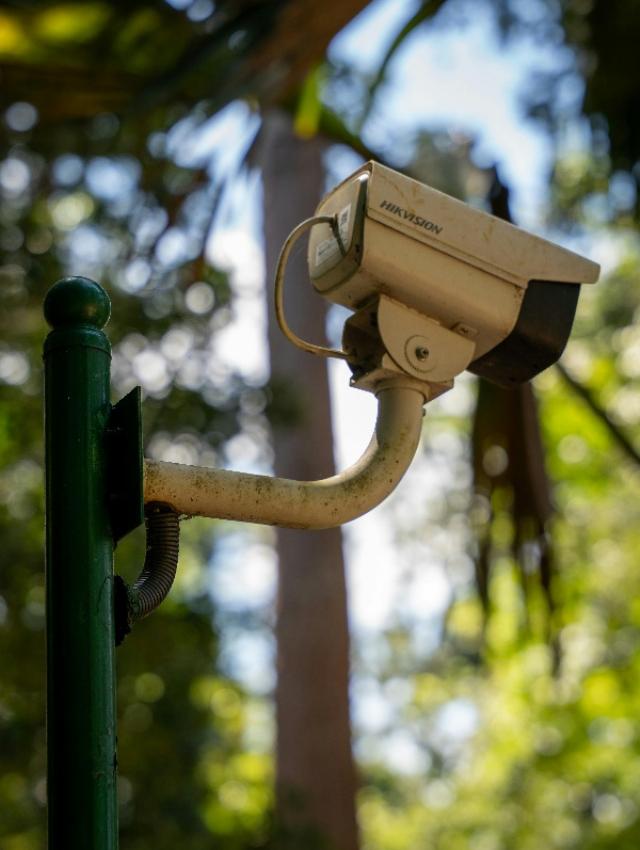Senate Bill 1462: Putting Alexa in the Woods
Congress has already rammed the Fix Our Forests Act through the House. Now it moves to the Senate as Bill 1462 -- and if there were ever a bill that deserved to be doused in cold water, it’s this one.
The premise sounds noble: early wildfire detection, faster response, safer forests. The reality? A nationwide surveillance grid dressed up in green camouflage. Cameras on towers, drones overhead, mesh networks buried in the soil, all feeding into proprietary artificial intelligence run by private companies and subsidized by federal tax dollars. We are being told to trade liberty for “safety” -- again.
Colorado has already become a test case. Xcel Energy partnered with Pano AI to install 21 surveillance towers across the state, claiming to cover more than 1.5 million acres. Think about that: more than Delaware in size, scanned minute by minute, 24 hours a day. Colorado is an outdoors state. People move here -- and visit here -- because they want freedom. They want to hike trails, ride mountain bikes, fish streams, and pitch tents under the stars. What they don’t want is to wonder whether a spinning camera on a ridgeline is tracking them, whether their kids’ campfire songs are being recorded, or whether an AI system in Silicon Valley has logged their license plate on a dirt road. But that is exactly where we are.
The chief evangelist of this model is Pano AI, founded by Sonia Kastner, formerly of Nest cameras, and Arvind Satyam, a World Economic Forum Young Global Leader. Satyam admitted that he was inspired to “fight wildfires” at Davos in 2020. That inspiration turned into a business model: $50,000 per tower, per year, sold not just to governments but to utilities, HOAs, and resorts. Subscribers can tap into feeds covering millions of acres. Kastner has been explicit about her company’s vision. In a podcast interview, she explained that Pano did a “gap analysis” between military surveillance technology and what firefighters currently have -- and decided to close the gap. Translation: they’re importing Pentagon-grade surveillance into American forests, then telling us it’s for our own good. No wonder the World Economic Forum gave Pano its “Trillion Trees” award. Their white paper makes no secret of the vision: forests blanketed with not just cameras, but microphones, drones, and mesh networks -- every acre wired and listening.
Of course, the sales pitch is always “safety.” Who doesn’t want to stop fires early? But history is clear: whenever the government says “for your safety,” look out. The Patriot Act was for our safety. Warrantless surveillance was for our safety. And now, 24/7 camera networks run by private contractors are “for our safety.” Meanwhile, the same government agencies that cry “emergency” do little about the fuel loads, thinning backlogs, and bureaucratic delays that make wildfires worse. If safety were the true goal, Congress would be funding forest management and community firebreaks. Instead, they’re subsidizing high-tech snooping.
And once the cameras are in place, “mission creep” is inevitable. Today the AI looks for smoke. Tomorrow, it could track zoning compliance, vegetation codes, even individual vehicles and faces. Don’t take my word for it -- just ask the lawyers suing Flock Safety in Virginia over license plate readers that store information for weeks at a time. Courts are already warning that long-term, warrantless tracking crosses constitutional lines. Pano AI is orders of magnitude bigger.
 Beyond privacy, S.1462 creates a glaring national security risk. These cameras sweep 10-20 miles, covering low-level military training routes, installations, and exercises. If hacked -- and everything can be hacked -- adversaries would have access to real-time reconnaissance of U.S. military activity without spending a dime. Ask yourself: has Pano AI been vetted by the Pentagon or DHS? Do their employees undergo full background checks? Does anyone know who has access to the raw data? The answers are either “no” or “trust us.” And when a company brags about ISO 27001 compliance, remember: that’s an IT framework, not a guarantee that the AI itself is secure, auditable, or hack-proof.
Beyond privacy, S.1462 creates a glaring national security risk. These cameras sweep 10-20 miles, covering low-level military training routes, installations, and exercises. If hacked -- and everything can be hacked -- adversaries would have access to real-time reconnaissance of U.S. military activity without spending a dime. Ask yourself: has Pano AI been vetted by the Pentagon or DHS? Do their employees undergo full background checks? Does anyone know who has access to the raw data? The answers are either “no” or “trust us.” And when a company brags about ISO 27001 compliance, remember: that’s an IT framework, not a guarantee that the AI itself is secure, auditable, or hack-proof.
What’s at stake here is not just firefighting policy. It’s the nature of freedom itself. Already, our homes are filled with listening devices -- Alexa, Siri, “smart” fridges, hacked Ring cameras. Now they want to put Alexa in the woods, listening to your campfire conversations and logging your license plate as you drive to a trailhead. Colorado is proof that this is not theoretical. Over a million acres are already under surveillance. Families hiking, hunters stalking elk, kids roasting marshmallows -- all of it is swept up in a system that exists to enrich a private company and empower government subscribers.
Wildfires are real. But so is liberty. And if we let the Senate rush through S.1462, we may discover too late that the greater danger wasn’t fire, but the system we built to watch for it. So the next time you go camping, remember this: the real sparks aren’t in the trees. They’re in the surveillance towers, quietly turning freedom into data. And unlike the campfire, those sparks won’t go out in the morning.
Image: Pexels